Euro 2016: Wales players' rapport with 'Red Wall' defines run to semi-final
- Published
- comments
Standing hand-in-hand like theatre actors at their curtain call, Wales' players were met with a spine-tingling rendition of the national anthem from their fans following their European Championship semi-final defeat by Portugal.
This was the end of the road for Wales in France but the 'Red Wall' - as Wales' players have dubbed their supporters - was still roaring its encouragement at full volume.
Wales' momentous campaign was halted by a clinical Portugal side but, watching their team play their first semi-final at a major tournament, this was no occasion for fans to feel deflated.
This was a moment of mutual adoration between a team who have established themselves as Wales' greatest, and their unwavering supporters.
The bond between Wales' players and fans has been one of the defining features of Euro 2016, a symbiotic relationship that has propelled the country's football to new heights.
As well as the anthem, 'Hen Wlad Fy Nhadau', and a repertoire of hymns, the Welsh chant of choice during this tournament has been 'Don't Take Me Home'.
There was a poignancy to its airing in Lyon, for it has been a dreamlike existence for Wales fans in France. With their team absent from major tournaments for 58 years, generations in Wales have grown up to expect failure and look on longingly as others contest World Cups and European Championships.
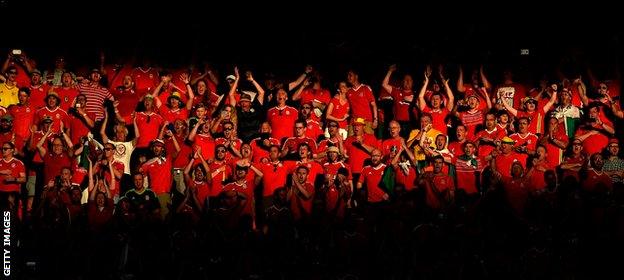
The 'Red Wall' of Wales supporters were unstinting even in eventual defeat
But Chris Coleman's men have changed that. The beaming smiles on Welsh fans' faces before their opening match in Bordeaux spoke of a disbelief at seeing their team finally claiming their place among international football's elite.
"There was a psychological barrier we needed to go through for the first one, given it had been so long," said Coleman.
"We've now sampled tournament football - such an experience, such a healthy vibe from people of all nations. We want some more of that. We need some more of that."
Wales' players would have been forgiven for feeling as if they were living in a bubble at their training base in the idyllic Brittany coastal town of Dinard, where a small population and a gentle pace of life meant they could take a stroll on the beach and go unnoticed.
It is a far cry from the frenzy their success has caused back home.
With every victory in France, a new fan zone seemed to spring up in Wales, from Rhyl to Aberystwyth, from Swansea to Cardiff's Principality Stadium.
The messages of support were many and varied, from David Hasselhoff to the Prince of Wales, while songs by Welsh bands the Manic Street Preachers and the Super Furry Animals gave the campaign a unique soundtrack.
Despite their serene and remote surroundings, however, the players were aware of the impression they were making.
In the age of social media, athletes and their followers are closer than ever, and Wales' squad members have relished that connection.
Hal Robson-Kanu's spectacular goal against Belgium made the unattached forward one of the unlikeliest stars of Euro 2016 and, speaking a couple of days later, he laughed when told about the global reaction to his goal - including a tweet from the former Nigeria and Arsenal striker Kanu.
There was a similar response from Joe Allen, who laughed when this reporter informed him of a fans' banner that read: "When God made Joe Allen, he was showing off."
From a journalist's perspective, covering this Wales side has been a privilege, given regular and revealing access to the coaches and players.
Gareth Bale, the world's most expensive footballer, was a picture of charm and affability as he conducted his media conferences and subsequent interviews before every match. The Real Madrid forward was as comfortable talking about the Wales squad's quiz nights and their occasional treats of burgers and chips as he was about the actual football.
For all the lustre the likes of Bale and Arsenal midfielder Aaron Ramsey add to this Wales side, it is the unbreakable team spirit that has been the foundation of their success.
The vast majority of the squad have played youth football together, grown up together and become close friends.
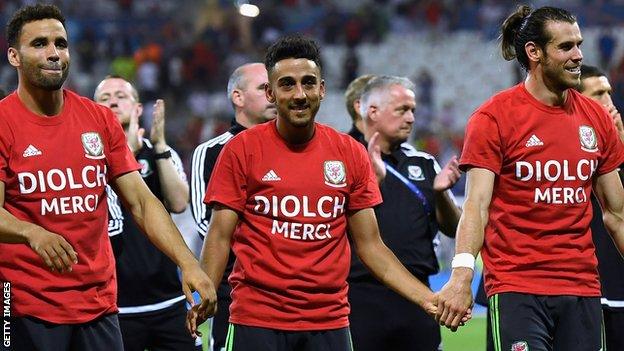
Hal Robson-Kanu, Neil Taylor and Gareth Bale joined the 'curtain call' as the Wales stars thanked supporters following their semi-final exit in Lyon
Even when Bale is injured, he will join up with the squad in order to see those he misses while on club duty in Spain - Joe Ledley and Wayne Hennessey are among those he gets on with best.
These genuine friendships have bound the team together, as has a tragedy that cast a shadow over football.
The death of Coleman's predecessor Gary Speed in 2011 shocked the entire sport, with the grief particularly profound for his young Wales players, many of whom are in the current side.
Captain Ashley Williams was clearly moved as he spoke about Speed on the eve of the match against Portugal.
"My thought coming in was I hope he'd be proud of us. He saw us grow up, and what we've achieved today," he said. "He's always in the back of our minds. When we achieve something, we think about him."
Speed was on the supporters' minds as well, with cries of "There's only one Speedo" heard at every game.
A friend of Speed's since childhood, Coleman says he thinks about his former team-mate every day, whether there is a fixture or not.
Succeeding his friend as Wales manager was a wrench for Coleman but there can be no doubt he and his players have done Speed proud.
Coleman said before the match against Portugal that this run to the semi-finals would not represent the end of his team's journey.
Absent from major tournaments for 58 years before Euro 2016, Wales are unwilling to endure another long wait.
The current crop of players is ripe for an era of regular qualifying, with Ashley Williams and James Collins the only players over 30 to start the match against Portugal. An average age of just over 27 means Wales' squad was the seventh youngest of the 24 teams at Euro 2016, and Coleman believes this tournament could be a springboard for further success.
"The one thing that will stop us from doing it again is ourselves," he said.
"We're good enough. We have to have the same hunger and desire, and we'll give the World Cup campaign a hell of a crack."
Wales will be back in action in September when they host Moldova in their opening qualifier for the 2018 World Cup.
Planning for that campaign can wait for now, though. With a homecoming parade taking place in Cardiff on Friday, Wales will take this opportunity to reflect on and revel in the magnitude of their achievement.
Just as they were at the final whistle in Lyon, Wales' players will be greeted by the great 'Red Wall' in Cardiff.
Returning home will feel like the end of the journey but, where Coleman and his players are concerned, this is not the final act.
- Published6 July 2016
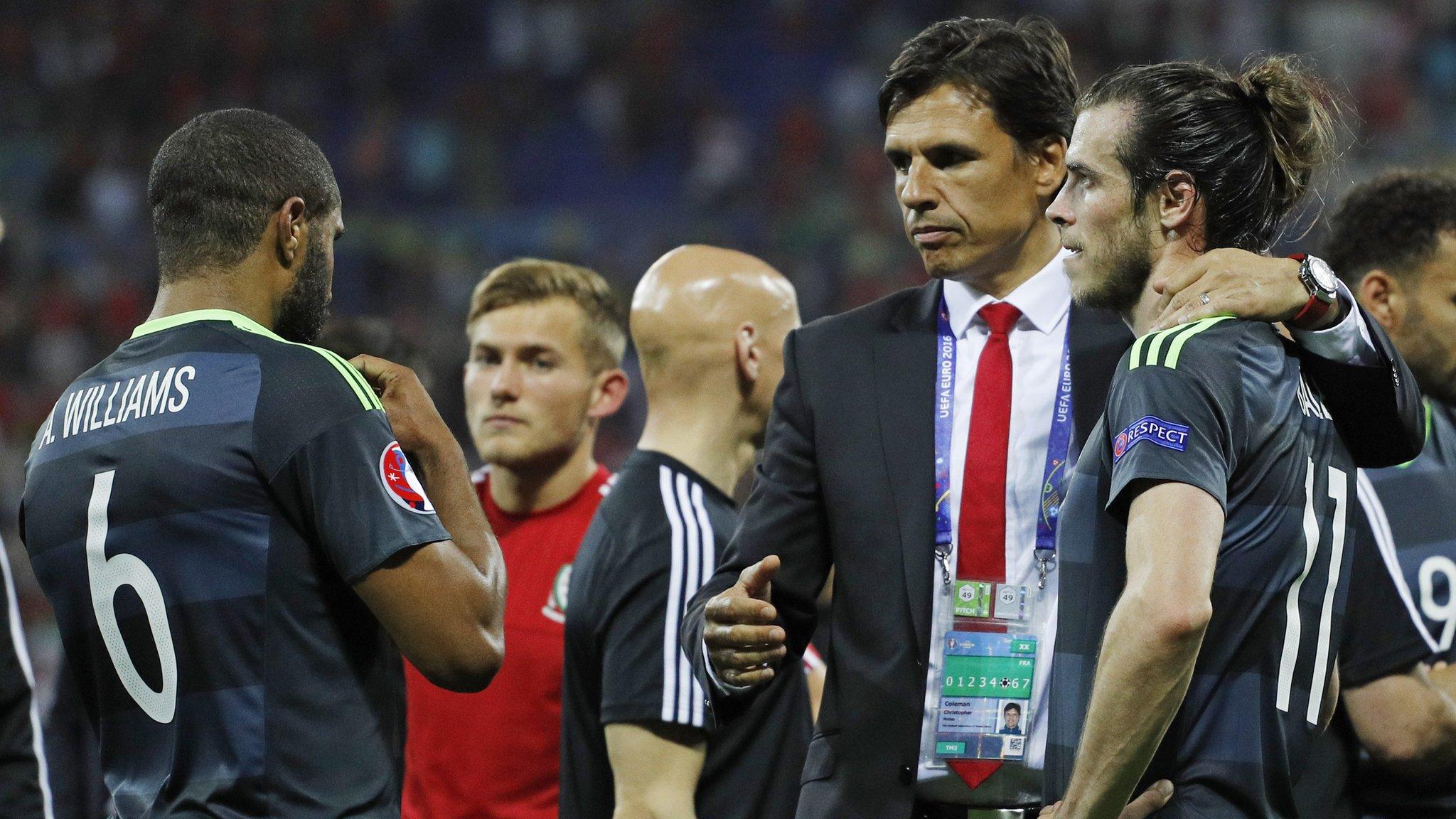
- Published6 July 2016
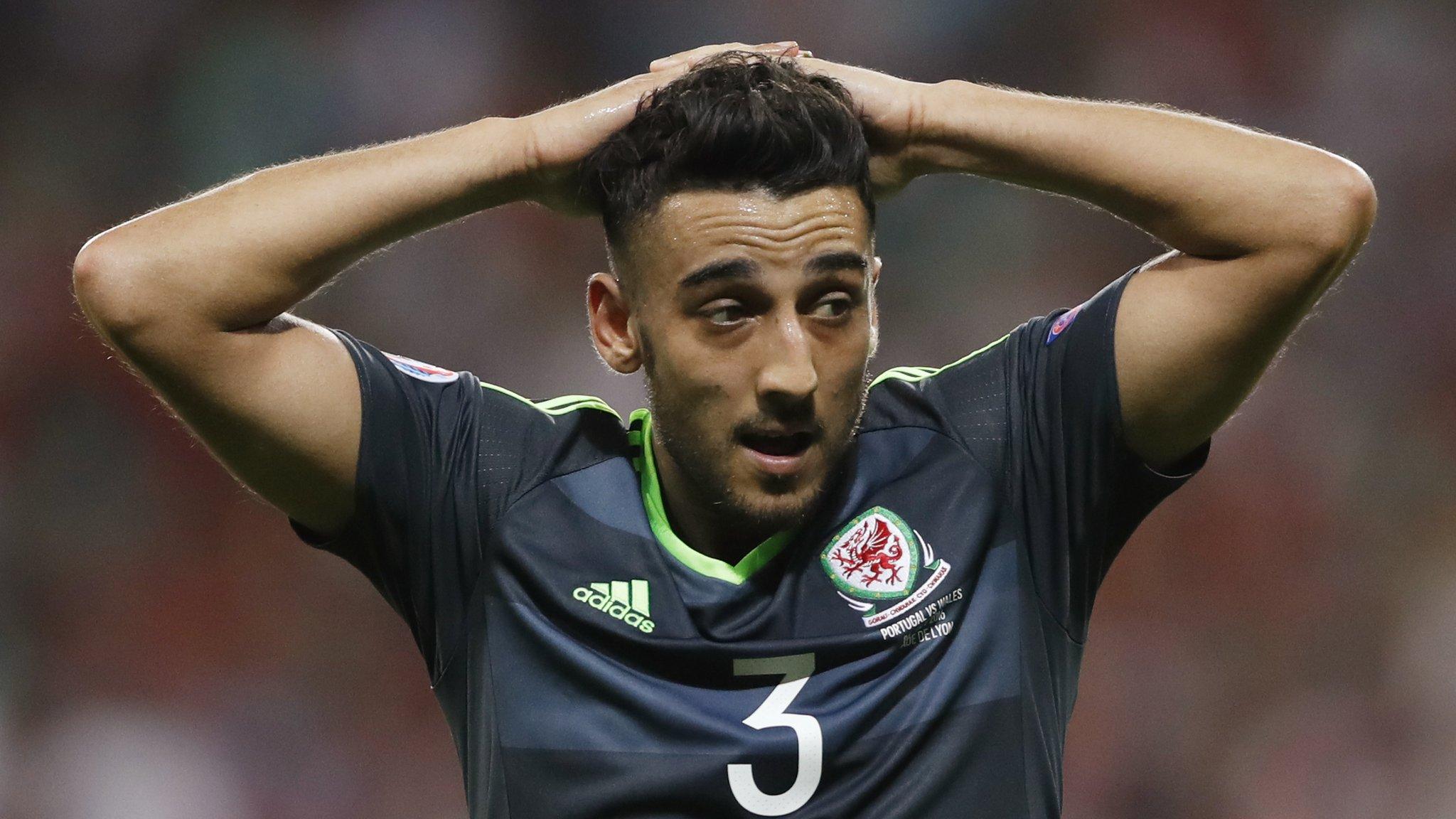
- Published6 July 2016
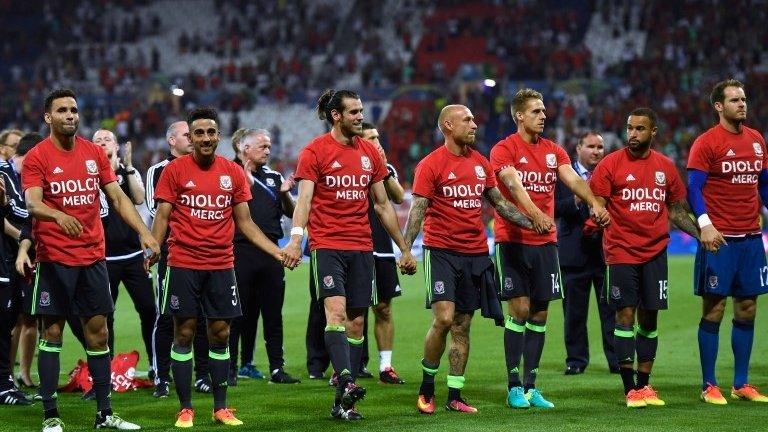
- Published7 July 2016
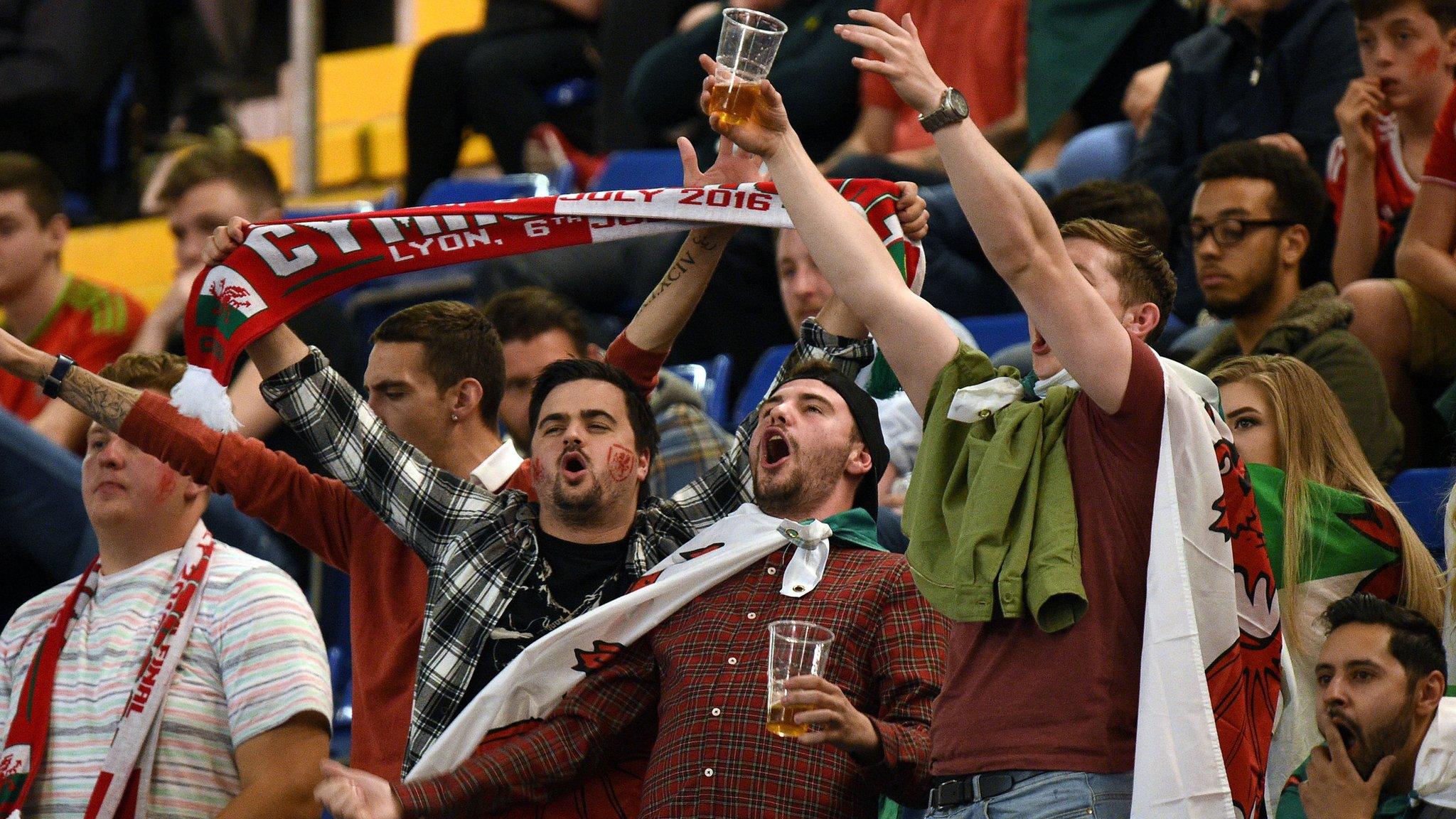
- Published7 July 2016
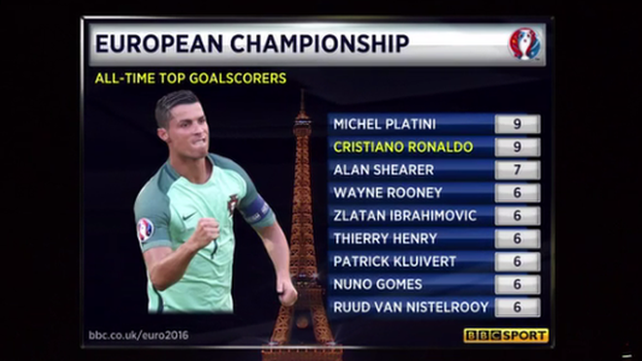
- Published20 June 2016

- Published7 June 2019
